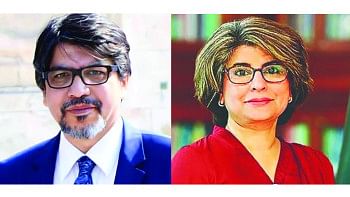War trial not to be 'motivated'
A cross-section of eminent personalities including legal experts yesterday suggested swift adjudication of the war crimes trial, while noting that the criminals must not be able to dodge justice, and the people must not get the impression that the trial is motivated by partisan politics.
At a roundtable they said the suspects are campaigning against the trial both at home and abroad, while the government seems not strategic enough to respond to it.
The daily Prothom Alo organised the roundtable titled "Trial of Genocide, Crimes against Humanity, and War Crimes", in its conference room in the capital.
"Try the war criminals during this government's tenure. First go for the leading figures. The trial must be transparent so that Bangladesh can create an example for the world," said Shahriar Kabir of Ekattorer Ghatak Dalal Nirmul Committee, a platform that tracks war criminals of 1971, and demands their trial.
He said Pakistan, and Bangladesh Jamaat-e-Islami are propagating against the trial, and the government should in no way take it lightly. It also must pay close attention to the intricacies of legal aspects, so the trial is foolproof, leaving no scope for the criminals to slip through loopholes, he added.
Stating that different ministers' comments on the trial have been confusing the people, he said it is the task of the tribunal to try the accused, so it would be better if the ministers refrain from making public comments on the matter.
He also suggested strengthening the prosecution and investigation teams, urging the government to provide them with efficient logistics for efficient performance.
LGRD Minister Syed Ashraful Islam said the government signed on to the Rome Statute to ensure transparency in the trial. "We are not politicising the trial," he said.
The motive behind the mass killings, arson, and repression in 1971 was however political, and that fact must be identified through the trial to ensure justice, he added.
Stating that questions might be raised regarding why the current government is putting so much emphasis on the war crimes trial when there are other nagging problems like crises of water and power supply, traffic jam, and rising prices of essentials, Ashraf said, "There is no link between the trial and the utility crises."
The trial will go on according to its own course, and the government is addressing the issue of utility crises on a regular basis, he said.
BNP Standing Committee Member Moudud Ahmed said the trial of war criminals is a must, but holding it under the International Crimes (Tribunal) Act 1973, will not ensure transparency and the international standard.
Terming the 1973 act as a dead law, he said it was enacted to try 195 personnel of the defeated Pakistani Army who had been identified as war criminals, but were later handed over to Pakistan under the Simla Agreement. He suggested that the trial is held under the country's conventional criminal law just like the Bangabandhu murder case.
Justice Golam Rabbani however said there is no problem in trying the war criminals under the 1973 act, which not only speaks of trying the 195 Pakistani prisoners of war, but also of those who aided them.
There is nothing in the law that says those not identified earlier cannot be identified and tried now, he said adding, "An effort is on to create confusion."
Shahriar Kabir said on the issue that the war criminals cannot be tried under the existing Evidence Act. The provisions regarding evidence in the International Crimes (Tribunals) Act 1973 are good enough to try the war criminals maintaining international standards, he added.
Sector Commanders' Forum leader Maj Gen (retd) KM Shafiullah said the government must have a comprehensive mechanism to try the war criminals, so that they could not dodge justice.
Professor Asif Nazrul of Dhaka University said some provisions should be added to the 1973 act to make it more acceptable. For example, he said any suspect who was below the age of 12 or 15 back in 1971 should be immune from prosecution, and it should be assured that the suspects will not be tortured during investigation.
Professors Dr Mizanur Rahman and Farida Banu, Dr Shahdeen Malik, Liberation War Museum Trustee Mofidul Hoque also spoke.
Prothom Alo Joint Editor Abdul Qayuum moderated the event, while its Editor Matiur Rahman was also present.

 For all latest news, follow The Daily Star's Google News channel.
For all latest news, follow The Daily Star's Google News channel. 



Comments